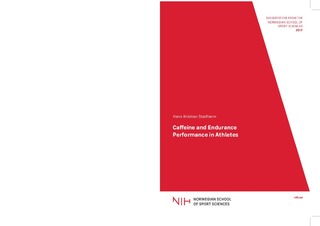Caffeine and endurance performance in athletes
Doctoral thesis
Permanent lenke
http://hdl.handle.net/11250/2440076Utgivelsesdato
2017Metadata
Vis full innførselSamlinger
Sammendrag
This thesis consists of five studies with additional unpublished results where the aim was to examine the effects of caffeine (CAF) ingestion on factors considered determining for endurance sport performance and fatigue. In total 65 male sub-elite and elite endurance athletes volunteered to participate, with twelve subjects participating in more than one study. All subjects included were trained endurance athletes with aVO2max in the range of 67.2 to 90.5 (mL·kg-1·min-1). All studies included in the dissertation were performed in a randomized, double-blind, placebocontrolled, crossover design at the Norwegian School of Sports Sciences in the Department of Physical Performance, between 2012 and 2016. Results from the five studies demonstrate that CAF ingestion of 3-6 mg·kg-1 is an effective stimulant for improving endurance performance. Improvements were greater during time until voluntary exhaustion (~8-20%) trials compared to time trial (TT) testing (~1-5%). Independent of mode, approximately 75% of test subjects improved their performance following CAF ingestion. The studies in this thesis suggest that CAF has a wide range of potential effects on several physiological and psychological mechanisms important for endurance performance. Results displaying improvements following CAF ingestion are closely related to CAF’s hypoalgesic effects in reducing rate of perceived exertion and pain, consequently allowing subjects to maintain higher exercise intensity with similar exertion. Novel findings in the thesis were that CAF ingestion increased aerobic power (VO2max), fractional utilization ofVO2max, anaerobic power (O2-deficit) and counter movement jumping heights, but led to no change in work efficiency, pacing strategy or substrate utilization. The conclusion of the thesis is that CAF is an efficient ergogenic aid for improving endurance performance independent of mode (time until voluntary exhaustion vs TT), duration (10-120min), muscular usage (double poling vs running), or geographical condition (sea level vs altitude) in top athletes. Paper I: Stadheim, H. K., Kvamme, B., Olsen, R., Drevon C. A., Ivy, J. L., Jensen, J. (2013). Caffeine increases performance in cross-country double-poling time trial exercise. Medicine and Science in Sports and Exercise. 2013, 45(11), 2175-83. Paper II: Stadheim, H. K., Spencer, M., Olsen, R., Jensen, J. (2014). Caffeine and performance over consecutive days of simulated competition. Medicine and Science in Sports and Exercise. 2014, 46(9), 1787-96. Paper III: Stadheim, H. K., Nossum, E. M., Olsen, R., Spencer, M., Jensen, J. (2015). Caffeine improves performance in double poling during acute exposure to 2,000 m altitude. Journal of Applied Physiology. 2015, 119(12), 1501-1509. Paper IV: Stadheim, H. K., Stensrud, T., Brage, S., Jensen, J. (Manuscript). Caffeine improves exercise performance, maximal oxygen consumption and accumulated oxygen deficit. Paper V: Stadheim, H. K., Jensen, J. (Manuscript submitted to Scandinavian Journal of Medicine and Science in Sports). Caffeine improves prolonged running performance. Scandinavian Journal of Medicine and Science in Sports.
Beskrivelse
Avhandling (doktorgrad) - Norges idrettshøgskole, 2017
